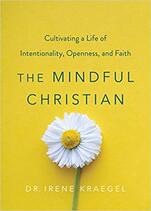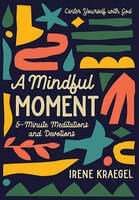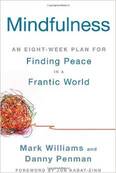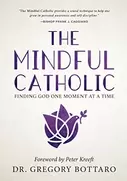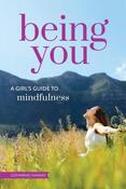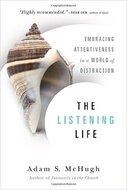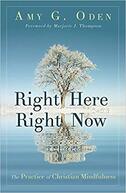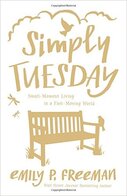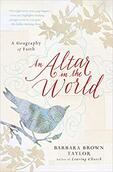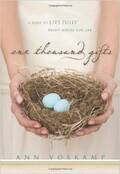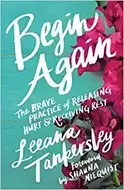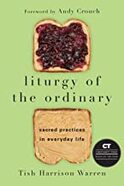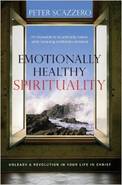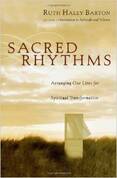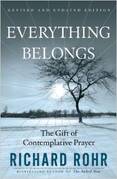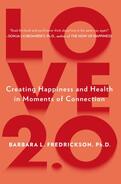RESOURCES
While one can only learn mindfulness meditation by meditating, reading & talking about it can help develop an understanding of the practice and enrich your experience. In addition to writing on The Mindful Christian blog , I share my own thoughts about the practice of Christian mindfulness in the following places.
Books
|
The Mindful Christian: Cultivating a Life of Intentionality, Openness, and Faith (Broadleaf Books, 2020) explores the life-giving blend of Christianity and mindfulness practice. Both practical and inspirational in nature, the resource serves as a guide for people of faith who desire to experience emotional healing and growth as they pay more attention to God's work in each moment.
Available at Indiebound.org, Amazon.com, Barnesandnoble.com, and Christianbook.com, and your local bookstore! |
|
A Mindful Moment: 5-Minute Meditations and Devotions (Zondervan, 2022) is written with teens in mind (ages 12-18) but is a great resource for the young-at-heart of all ages. Rooted in Scripture and in the tradition of Mindfulness-Based Stress Reduction (MBSR), this simply designed and inspirational book includes a how-to guide to Christian mindfulness meditation and 150 devotions.
Available at Indiebound.org, Barnesandnoble.com, Amazon.com, Christianbook.com, and your local bookstore! |
Articles & guest blog posts
The Banner article - Mindfulness and Christian faith
Church Leaders article - A Healthy Church is a Mindful and Resilient Church
Grand Rapids Center for Mindfulness guest post - Do Christianity and mindfulness go together?
Mindful Teacher guest posts -
Church Leaders article - A Healthy Church is a Mindful and Resilient Church
Grand Rapids Center for Mindfulness guest post - Do Christianity and mindfulness go together?
Mindful Teacher guest posts -
- How Christians can benefit from mindfulness practice: Interview
- Can Evangelical Christian practice mindfulness?
- What does the Bible say about mindfulness and compassion?
- Mindfully Meditative Christian Practices
Podcast appearances & audio/video resources
- All Belong, Inc. - Supporting Mental Health in Times of Uncertainty: Faithful Mindfulness for Inclusive Communities
- Broadleaf Books - Mindful Moments with Irene Kraegel
- HEARTtalk - Mindfulness & The Mindful Christian
- Hope for Anxiety & OCD - Episode 16: Is Mindfulness for Christians?
- Houghton College Chapel - Around the Table #9
- The Kingdoms Podcast - Christian Mindfulness for Inner Peace and Practicing Self-Care (Youtube, Spotify, or Apple Podcasts)
- Mindfully Refreshed - The Mindful Christian
- The Pocket Contemplative - Christian Mindfulness
- Praxis: Christian Wellness - Demons, Depression, and Paying Attention: Christian Mindfulness
- Present Moment: Mindfulness Practice and Science - Episode 158: The Mindful Christian
- WHI Health & Wellness - Mindfulness Tips
For video resources from others providing education and inspiration related to the practice of mindfulness, either from a Christian or a non-religious perspective, explore the playlists on The Mindful Christian YouTube channel.
Other books
These books from other authors explore themes related to meditation, mindfulness, and present-moment awareness from a Christian perspective - or from a secular perspective compatible with Christian faith.
|
Mindfulness: An Eight-Week Plan for Finding Peace in a Frantic World
by Mark Williams & Danny Penman Williams and Penman present mindfulness in a clear and down-to-earth manner, with an option to try out the practice through a detailed eight-week program. The book links to an excellent series of online audio guides for mindfulness meditation. The book is presented from a nonreligious perspective but is consistent with Williams' training as an ordained minister in the Church of England.
|
|
The Mindful Catholic: Finding God One Moment at a Time
by Gregory Bottaro Bottaro skillfully weaves together the practices of Mindfulness-Based Stress Reduction with the practice of Catholicism, guiding his readers in an exploration of mindfulness from an approach that is deeply rooted in both psychology and Catholic faith. Accompanying mindfulness guides (along with other faith-based mindfulness resources) can be found on the CatholicPsych Institute website.
|
|
Being You: A Girl's Guide to Mindfulness
by Catharine Hannay This guide to mindfulness for teenage girls is actually applicable for all of us, whatever our age or gender. Full of wisdom, down-to-earth life examples, and easy mindfulness practices, the book will affirm the challenges of the teenage years while gently affirming our identity as loved and strong. Hannay effectively incorporates examples of Christian language for believers who are interested in this type of integration.
|
|
The Listening Life: Embracing Attentiveness in a World of Distraction
by Adam McHugh McHugh explores the transformational power of listening to God, to Scripture, to creation, to one another (including those in pain), and to our own lives. In the process, he gives a glimpse into the possibilities for connecting with God through the practice of present-moment awareness.
|
|
Right Here Right Now: The Practice of Christian Mindfulness
by Amy G. Oden This is a straight-forward description of mindfulness throughout Christian tradition, with identification of a four-step process to bringing mindful awareness into each moment as integrated with religious practice. Rather than weaving Christian faith into formal mindfulness practices, the book weaves informal mindfulness principles into religious practice.
|
|
One Thousand Gifts
by Ann Voskamp Voskamp exhorts readers to become more awake to the present moment so that we can be aware of (and thankful for) the gifts given by our Creator. See video book trailer for more details.
|
|
Emotionally Healthy Spirituality: Unleash a Revolution in Your Life With Christ
by Peter Scazzero Scazzero makes a compelling case for intentionally increasing our awareness of the inner life as a foundational step in spiritual health, including a focus on the role of silence in strengthening emotional well-being.
|
|
Love 2.0: How Our Supreme Emotion Affects Everything We Feel, Think, Do, and Become
by Barbara L. Fredrickson Fredrickson explores the role of "micro-moments of connection," utilizing science and common-sense to illuminate the power of love. Without explicitly applying a Christian perspective, she manages to deepen our understanding of why love is named as "the greatest of these" in Scripture.
|
Other books:
Centering Prayer and Inner Awakening by Cynthia Bourgeault
Spiritual Disciplines Handbook: Practices That Transform Us by Adele Ahlberg Calhoune
Christian Meditation: Experiencing the Presence of God by James Finley
Sanctuary of the Soul: Journey Into Meditative Prayer by Richard Foster
Addicted to Hurry: Spiritual Strategies for Slowing Down by Kirk Byron Jones
Ordering Your Private World by Gordon MacDonald
Out of Solitude: Three Meditations on the Christian Life by Henri Nouwen
Centering Prayer and Inner Awakening by Cynthia Bourgeault
Spiritual Disciplines Handbook: Practices That Transform Us by Adele Ahlberg Calhoune
Christian Meditation: Experiencing the Presence of God by James Finley
Sanctuary of the Soul: Journey Into Meditative Prayer by Richard Foster
Addicted to Hurry: Spiritual Strategies for Slowing Down by Kirk Byron Jones
Ordering Your Private World by Gordon MacDonald
Out of Solitude: Three Meditations on the Christian Life by Henri Nouwen
Other Christian articles & blogs about mindfulness
Here are some articles and blog entries from other authors that also explore the role of mindfulness practice in the life of a Christian.
Mindfulness: A Christian Approach (Focus on the Family)
"...can mindfulness ever be a safe and positive option to manage stress and develop a healthier thought life? Yes! Christians and many faith-based counselors use mindfulness in a Christ-integrated way as a therapy tool. They believe mindfulness can be compatible with a biblical worldview — as long as it’s rooted in Scripture and focuses on connecting with God."
Woman Alive Magazine interviews Cathy Wield - Mindfulness & Christianity by Sharon Barnard (Instant Apostle)
"...mindfulness is really the new name given to a practice that has existed for centuries in both Eastern and Christian traditions. 'It is a practice of meditation but it is not religious in itself. In the same way that compassion and forgiveness are central to Buddhism – we know that we do not worry that they are also central to Christianity, so why should we be so concerned about meditation which is mentioned countless times in the Old Testament! It is one aspect of Christian meditation, which also involves other forms such as the Ignatian tradition of biblical imaginative meditation. When mindfulness is practised from a Christian perspective, it helps one to be aware of God’s presence and as a consequence, it leads to an increasing awareness of his presence in general life. It also enhances the experience of God speaking to you and guiding you, and brings you closer to him. The Bible illustrates God meeting people at special moments in their lives and this practice allows one to be more aware of those moments.'
An apologetic for a Christian practice of mindfulness by Jessica Clevering, PhD (Psychology Renewed)
"God created us so to live one moment of our lives at a time. Christians who dwell on the past find it difficult to mature and grow and work toward the kingdom of God. Christians who focus on the future may forget to acknowledge who holds the future. God gives us one moment at a time and if we constantly think about our lists, our schedules, and all the things we have to do we run the risk of not fully honoring and respecting God, his creatures, or his creation.... By living in the present moment we honor God, who, existing outside of time, also lives in an eternal present. This too is a practice of mindfulness."
Christian mindfulness: Learning how to be awake and alive by Kim Gaines Eckert (Today's Christian Woman)
"Meditation and mindfulness are not inherently Buddhist any more than prayer is the property of one particular religion. Meditation practices are part of the contemplative traditions of many religions, including Christianity and Judaism (which predates Buddhism). In fact, we can see principles of mindfulness expressed in Scripture and throughout Christian history."
A Christian perspective on attention, awareness, and mindfulness by Shaun Lambert (Mind & Soul: Exploring Christianity and Mental Health)
"Jesus commands watchfulness and mindfulness: ‘What I say to you, I say to everyone: ‘Watch!’ (Jesus of Nazareth, Mark 13:37).... Christian mindFULLness is awareness of the presence of God at work within our own God-given capacities for attention and awareness."
Being still in a busy world by Shaun Lambert (Evangelical Alliance: Better Together)
"The new wave of cognitive therapy is mindfulness-based. However, Christian related concepts such as watchfulness and Christian contemplative practices like the slow meditative reading of Scripture known as Lectio Divina, practicing the presence of God, prayers such as the Jesus Prayer, biblical meditation, silence and solitude have not [been] featured in the market-place, and this new cultural quest for interior freedom is only on the periphery of the Church's awareness. It shouldn't be. Watchfulness, attentive hearing and seeing are an integral part of the gospel Jesus taught."
Mindfulness and Christian meditation by Shelagh Layet (Christian Meditation in the UK)
"As a Christian Meditator following the teaching of Jesus, we are called to ‘leave self behind’. This is what we are doing in Christian Meditation, leaving behind the small egotistical mind and our obsession with our sense of self, in order to find the fullness of being to which the practice opens us."
Mindfulness as known by the church fathers by Fr. George Morelli (Antiochian Orthodox Christian Archdiocese)
"A vigilance and watchfulness of the mind and heart somewhat similar to the cognitive-rational-emotive therapy technique employed by psychologists in helping patients to be ‘mindful’ and thus learn control of thoughts and feelings is a frequent theme in the writings of the early Fathers of the Eastern Christian Church. These early Christian spiritual teachers taught their disciples to develop nepsis, that is, to be wakeful and attentive (from the Greek verb nepho: to be vigilant, mindful) to that which was inside and around them. Thus, we also need to practice being completely 'present' to our thoughts and surroundings. This is analogous to a military scout at the head of a column, or a busy parent 'attending' to their newborn infant."
God and mindfulness by Mark Vernon (Philosophy and Life blog)
"What is the model of being human that lies behind [mindfulness]? It is that in spite of appearances, all is well. Creation is benign. Life can be trusted. Suffering certainly copiously exists but a stronger grace longs to be felt, if only we can ease up on our desperate self-holding and so know it in some silence. To put it another way, mindfulness is premised on the conviction that our worried egos and daily preoccupations veil the truth that our lives rest in a life that sustains and supports all things. Again, mindfulness teachers will stick to secular language such as 'training the observer' or 'simply noticing'. That's right, that's the practice. But why do that if letting go were letting go into a godless, heartless void? It seems to me that, in practice, mindfulness nurtures the experience of knowing the God 'in whom we live and move and have our being'.
Christian mindfulness meditation by Karen Wilson (MindsetMatters: Finding Peace in any Storm)
"The last thing Jesus said to his disciples before being taken up into heaven was, 'Surely I am with you always, to the end of time' (Matt 28:28). Notice the present tense he uses. He is with us always, because he is in the present moment. Moreover, all throughout the Bible, God is known as 'I AM,' demonstrating that God is always in the present, always has been, and always will be. We are not placing our trust in a being who will be there one moment, but not the next. We are placing our trust in the ever-present Lord of the Universe. The more we learn to focus on the present moment, the more we will become aware that God is right there with us, too. Jesus is right there with us."
The following blog sites are dedicated specifically to the integration of mindfulness and Christian faith.
Mindful
James Wilhoit, PhD, taught Christian Formation and Ministry for 35 years at Wheaton College, an evangelical institution. He holds a doctorate degree in Religion from Northwestern University, a Master of Divinity from Trinity Evangelical Divinity School, and a Master of Religious Education from Covenant Theological Seminary.
James Wilhoit, PhD, taught Christian Formation and Ministry for 35 years at Wheaton College, an evangelical institution. He holds a doctorate degree in Religion from Northwestern University, a Master of Divinity from Trinity Evangelical Divinity School, and a Master of Religious Education from Covenant Theological Seminary.
Mindful Musings
Stephen Allen, PhD, has taught psychology at a number of Christian institutions, including North Greenville University (Southern Baptist) and LeTourneau University (interdenominational). He holds a doctorate in Counseling and Human Development from the University of Iowa, as well as a masters degree in Theology from Dallas Theological Seminary.
Stephen Allen, PhD, has taught psychology at a number of Christian institutions, including North Greenville University (Southern Baptist) and LeTourneau University (interdenominational). He holds a doctorate in Counseling and Human Development from the University of Iowa, as well as a masters degree in Theology from Dallas Theological Seminary.
